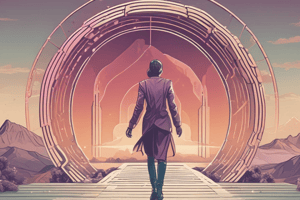Podcast
Questions and Answers
What skills are History students expected to showcase according to the text?
What skills are History students expected to showcase according to the text?
- Athletic and physical skills
- Artistic and creative skills
- Analytical, critical thinking, and writing skills (correct)
- Mathematical and scientific skills
How does History explore topics, as mentioned in the text?
How does History explore topics, as mentioned in the text?
- By examining timeless and evolving subjects (correct)
- By disregarding geographical areas
- By avoiding in-depth analysis
- By focusing only on recent events
Which historical civilizations are mentioned as part of the Ancient History subtopic for 2024?
Which historical civilizations are mentioned as part of the Ancient History subtopic for 2024?
- Viking and Mongol civilizations
- Ancient Greece, Rome, Egypt, and the Indus Valley Civilization (correct)
- Ottoman and Byzantine civilizations
- Aztec and Inca civilizations
How is the concept of utilizing technology relevant to History students?
How is the concept of utilizing technology relevant to History students?
What time period does the Modern History curriculum typically cover?
What time period does the Modern History curriculum typically cover?
What is a key skill that History students must develop to succeed in the subject?
What is a key skill that History students must develop to succeed in the subject?
Why is it important for students to be able to distinguish between different types of historical sources?
Why is it important for students to be able to distinguish between different types of historical sources?
What role does digital literacy play in the study of History in the modern age?
What role does digital literacy play in the study of History in the modern age?
Why must students be able to construct and defend arguments in History?
Why must students be able to construct and defend arguments in History?
What opportunities do digital resources offer History students?
What opportunities do digital resources offer History students?
Flashcards are hidden until you start studying
Study Notes
The NSW HSC Board's History Subject: A March 2024 Overview
As the NSW Higher School Certificate (HSC) Board approaches March 2024, History students are preparing to showcase their analytical, critical thinking, and writing skills, examining the past in ways that will equip them for the future. In the vast realm of human experience, History explores topics that are both timeless and continuously evolving, making it a dynamic and endlessly compelling subject.
Search and AI in History: A Contextual Perspective
While a search engine like Bing Chat's "No Search" feature might not be directly applicable to History students, the concept of utilizing technology to access and process information is relevant. Like Bing Chat's new feature, History students must engage with sources critically, using appropriate techniques to evaluate their trustworthiness and accuracy.
History's Subtopics for 2024
The HSC Board's History curriculum for 2024 is designed to offer a balanced and comprehensive perspective across different time periods and geographical areas.
- Ancient History: Covering the era from the beginning of human civilization to around 500 CE, this portion of the syllabus examines the growth of civilizations and their cultural and social developments, including ancient Greece, Rome, Egypt, and the Indus Valley Civilization.
- Modern History: This section of the curriculum spans from the 15th century to the present day, focusing on the transformative events and trends that have shaped the modern world, such as the Renaissance, Reformation, Enlightenment, World Wars, Cold War, and decolonization.
Unpacking History's Complexities: The Role of Skills and Analysis
To succeed in History, students must develop a range of skills that enable them to critically analyze both primary and secondary sources.
- Source Analysis: Students must learn to distinguish between various types of sources, including firsthand accounts, historical documents, and modern interpretations, and be able to evaluate their trustworthiness and accuracy. They must also be able to draw conclusions about the past based on their analysis of sources.
- Argument Development: Students must be able to construct and defend a sound argument based on the evaluation of sources and their own analysis. They must be able to express their ideas clearly and concisely, using evidence and citing sources appropriately.
- Critical Thinking: Students must be able to think critically about the past, considering multiple perspectives and evaluating their own and others' ideas. They must be able to identify patterns and trends and be able to explore connections between historical events.
History and the Digital Age
In the digital age, History students have access to an unprecedented wealth of information, offering both opportunities and challenges.
- Digital Resources: Students can access a wide variety of digital resources, including primary and secondary sources, interactive maps, and multimedia content. These resources can enhance students' learning experiences and provide new opportunities for exploring history.
- Digital Literacy: Students must develop their digital literacy skills, learning to evaluate the credibility of online sources and to identify misinformation. They must also learn to think critically about the way that history is presented online.
Conclusion
As the NSW HSC Board's History subject approaches its March 2024 exams, students must be prepared to engage with a diverse range of sources and to think critically about the past. They must be able to draw conclusions based on their analysis and to develop a sound argument. With the digital age offering new opportunities and challenges, History students must also develop their digital literacy skills and learn to evaluate the credibility of online sources. By engaging with the history curriculum critically and thoughtfully, students will be equipped to explore the past and to apply their learning to the present and the future.
Studying That Suits You
Use AI to generate personalized quizzes and flashcards to suit your learning preferences.




